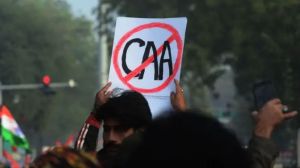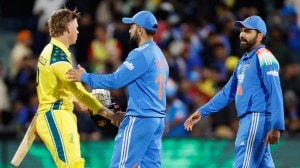Kashmir and Madeleine the daughter
The visit of Madeleine Albright, the US Secretary of State, provides a peg to recall her indirect connections with Kashmir which I discover...

The visit of Madeleine Albright, the US Secretary of State, provides a peg to recall her indirect connections with Kashmir which I discovered by happenstance. In 1981-82 she and I were both fellows at the `Castle’ as the Smithsonian headquarters is called where the Woodrow Wilson Centre for Scholars is also located in Washington. Madeleine Albright was doing research on Eastern Europe as a follow up on the study of the Prague Spring. I was trying to fathom on why in the wake of Pearl Harbour and after nearly five years of active support by President Roosevelt for the independence of India, like the hound in Sherlock Holmes, America remained silent and detached in the Spring of 1947 when the fate of the subcontinent was on the anvil.
It was only after some months that I learned that her father was Ambassador Korbel who was India’s nominee when in 1948 the United Nations Commission on India and Pakistan was constituted. (Pakistan’s nominee was Argentina; the Security Council added Belgium and Columbia and the President of the Security Council designated the US to the five-member Commission).
Ambassador Korbel, in the Commission’s discussions, had shown understanding and sympathy to India’s complaint and pleas. I told her that even as a junior officer in the first year of my service I had several occasions to meet Ambassador Korbel. Indeed I had delivered to him in my Topolino Fiat – we had no access to staff cars at the time – at the Maidens hotel in old Delhi the acceptance of the proposals of 13th August 1948 which envisaged sequentially a cease-fire, withdrawal of Pakistan army units and the Pathan infiltrators, the thinning of Indian Security forces and thereafter a plebiscite. This was a crucial document in the evolution of Kashmir’s diplomatic story.
Ambassador Korbel had been appointed by the Benes Government as the representative of Czechoslovakia to the UN and the Security Council but in 1948 Stalin smothered the only functioning democracy in Eastern Europe. The Korbel family took refuge in the US and so the future Secretary of State became an American citizen. After establishing this link, we frequently lunched together and she gave me a signed copy of her father’s book Danger in Kashmir.
India-Pakistan relations have a complex history. There have been misperceptions by India and Pakistan which got compounded by the UK and the US and other countries. The Secretary of State and her advisers have to become sensitive to the political reality of resilient emotions.Let me illustrate the point. On November 3, the 4th battalion of Kumaon Regiment, at present stationed in Udaipur, re-enacted on the occasion of 50th anniversary a sound and light presentation of the battle to save Badgam on the outskirts of the Srinagar Airport. In the eerie darkness of the Aravalis, before the officers, JCOs and young other ranks, the last signal of Major Somnath Sharma to his Brigadier Headquarters was flashed on the screen. “Though surrounded on three sides and outgunned I will not withdraw even by an inch; we would continue to fight the enemy (the infiltrators) till the last round”. Major Sharma died in a hail of bullets but posthumously earned the first Paramveer Chakra (equivalent to the Victoria Cross) of Independent India. The Sharma family has produced many Generals including a Chief of the Army Staff and two Lt. Generals. Besides many of the Sharma family, scores of former officers who served with the Battalion had come from long distance to pay tribute to those who died in the Badgam battle.
The saving of Srinagar and the capture in 1948 of Jojila pass by Major General Thimmaya (who also belonged to the Kumaon Regiment) are part of the legends which are the underpinnings of descipline and morale of the Indian Army. Not even civilian control of the Defence forces can risk overlooking the price paid in blood in the defence of Kashmir.
If we are to move forward beyond occasional summits and photo opportunities, it would require bold thinking, sensitive understanding of gridlocked political realities and mature confidential diplomacy. Both countries have not fully recognised that after the fall of the Berlin Wall there are no more benevolent godfathers; nor are there active conspiracies of malevolence.
The writer is a former foreign secretary



- 01
- 02
- 03
- 04
- 05




























